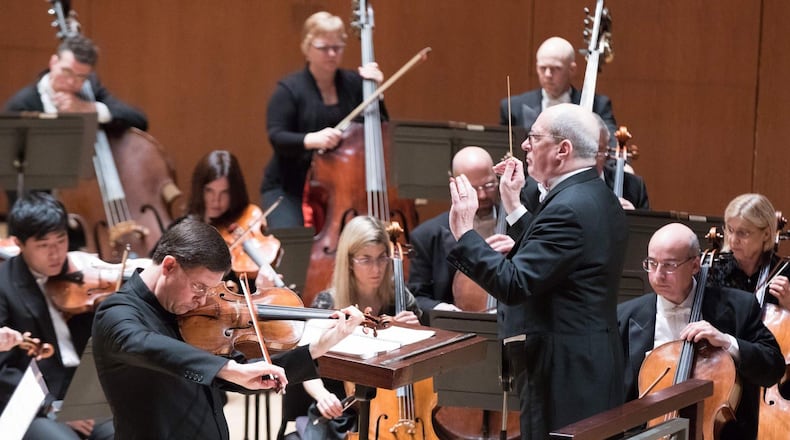When Atlanta Symphony Orchestra music director Robert Spano helped introduce Jennifer Higdon's cerebral, sometimes inscrutable Viola Concerto during its premiere with the Curtis Chamber Orchestra at the Library of Congress in 2015, the composition was simply a new work from one of America's most visible composers.
Soloist Roberto Diaz took the stage that evening, with Higdon looking on, to highlight one of the lesser-spotlighted instruments in the orchestra.
Thursday night at Symphony Hall, it almost seemed like deja vu. Diaz and Spano were center stage; Higdon sat in the audience. But now the ASO finally had a chance to interpret Higdon’s piece, which in the meantime had earned the composer a Grammy for best contemporary classical composition.
The ASO has a long association with Higdon, who is a member of Spano's inaugural Atlanta School of Composers cohort, but the ensemble hadn't performed any of her works since the well-received Concerto for Orchestra in 2015. Her viola showpiece is an important work that, given Higdon's association with Atlanta, was overdue for a performance.
>> RELATED: Read the AJC's review of that 2015 concert
Diaz gives the viola a deep, hypnotic sonority. For much of the piece, he sets to work breezing through a dense series of notes, but it’s in the slow passages, when time almost stops, where his instrument really sings. He has a delicate, deep tone that loses some luster when he ramps up the speed. While Diaz sawed through endlessly tricky configurations of notes with ease, the orchestral accompaniment moved in and out of switchback melodic lines, as if the ensemble were speeding down a mountain. At times, it sounded as if the accompaniment and the solo voice didn’t quite move together as a unit.
Spano also helped bring Thursday’s opening composition, Alex Turley’s “City of Ghosts,” into the world, leading the Melbourne Symphony Orchestra in the premiere of the Australian’s masterful 10-minute orchestral rumination in 2016.
“City of Ghosts” quickly establishes an eerie, unsettling musical mood — a vaguely Eastern-tinged aesthetic wrapped in ethereal strings — coming from a significantly pared-down orchestra. (In order to make the quick switch from “City of Ghosts” to Higdon’s concerto, which calls for a far larger orchestra, legions of empty chairs dwarfed the small ensemble, adding to the disquiet nature of the music.) Spano brought out masses of sound from the small ensemble that moved like glaciers of dissonance, slowly shifting within the orchestra.
“City of Ghosts” is cinematic in its approach, and Turley has deftly painted a coherent, pictorial sound world that is full of suspense. Occasionally, he calls for decidedly modern performance techniques — microtonal wanderings on the alto flute, pitch bends on the cello — but these methods are always in service of creating an accessible, brilliant piece of music. The composition comes to a close with a sigh — a tuneless exhalation through brass instruments that seems to say “I’ve said it all.”
After intermission, a greatly expanded orchestra made “Symphonie Fantastique,” which was written by Hector Berlioz in 1830, sound every bit as modern as the preceding 21st-century works. From the plangent English horn solo opening the sublime third movement, “Scene in the Country,” to the thundering horn chorale in the final movement, “Dream of a Witches’ Sabbath,” every step in “Symphony Fantastique” was perfectly executed.
The ASO on Thursday was a succinct picture of the ensemble as it heads into its 75th anniversary year: one foot in the forward-thinking music of the past; the other firmly planted in the music of our present.
CONCERT REVIEW
Atlanta Symphony Orchestra
8 p.m. Jan. 24. Additional performance at 8 p.m. Jan. 26. Sold out. Symphony Hall, 1280 Peachtree St. NE, Atlanta. 404-733-5000, atlantasymphony.org.
IN OTHER NEWS:
About the Author
Keep Reading
The Latest
Featured


